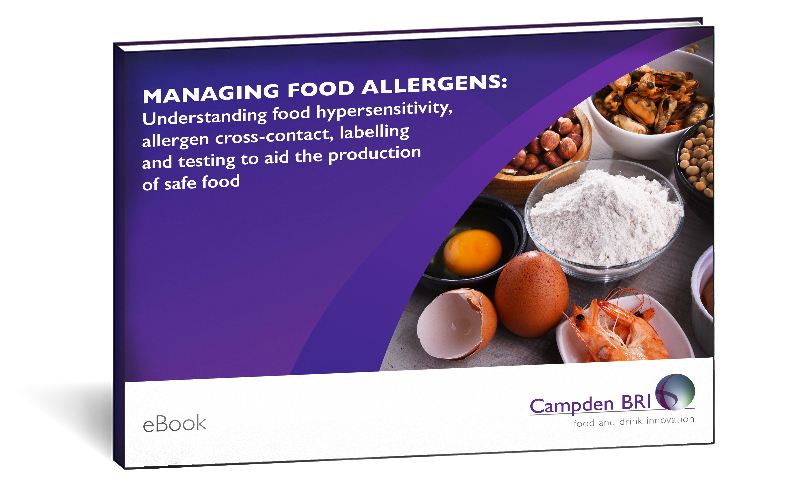
Food allergen management and labelling – the food industry’s evolution
4 August 2023 | Helen Arrowsmith, Regulatory Affairs Manager and Allergen Specialist
Having worked at Campden BRI since 2004, the early part of my Campden BRI career coincided with the EU and UK food industry navigating Directive 2003/89/EC, which amended the labelling Directive 2000/13/EC at that time with regard to food allergens. The Directive and implementing Regulations in the UK required that where specified allergenic foods (or their derivatives) were used as ingredients in prepacked foods, the relevant allergenic food was to be indicated on the labelling.
Download our FREE Managing Food Allergens eBook today! Secure food safety, control and confidence through effective allergen management

The food industry’s allergen management evolution
From 25 November 2005, products not complying with this legislation were prohibited. This legislation, however, did not cover allergenic foods that are unintentionally present in food products as a result of cross-contact. The requirements though drew attention to food allergens and sparked requests for guidance and training, as well as an increased demand for our food allergen testing services.
A few years after the legislation took effect, the industry then seemed to move into a phase characterised by enquiries from food and drink business operators (FBOs), who were wanting to check whether the allergen management procedures they had in place were appropriate – in effect, whether what they were doing was ‘right’. As the industry and legislation continued to progress in a positive direction of increased food allergen awareness and control, so too did the occurrences of news headlines relating to food product recalls and to real-life stories of the serious implications of some allergic reactions.
The relevant legislation changed with the publication in 2011 of the harmonised EU Regulation (EU) No 1169/2011, as amended, on the provision of food information to consumers (FIC), which has been retained into UK law post-EU Exit (see retained Regulation (EU) No 1169/2011 ). This legislation has applied in the EU and UK since 2014.
Annex II to the FIC lists 14 substances or products causing allergies or intolerances that must be emphasised in the ingredients list on the label of prepacked food and drink. Such labelling requirements apply when these substances have been deliberately included as an ingredient, are contained as part of a compound ingredient or are a processing aid. The current legislation still does not specifically deal with unintentional presence of food allergens due to cross-contact, but there continues to be developments in this area. See our blog on precautionary allergen labelling (PAL) – ‘Are you following developments in precautionary allergen labelling and information?’.
The FIC also brought about new requirements for provision of allergen information for food sold non-prepacked (i.e. sold loose (such as in food service establishments), packed on the sales premises at the consumer’s request or prepacked for direct sale). Then, in the UK in 2019 to 2022, legislation was laid that requires foods prepacked for direct sale to be labelled with the name of the food and an ingredients list with the FIC Annex II substances emphasised.
Where are we now
The food and drink industry’s current status, with respect to substances or products causing allergies or intolerances, can be characterised by the majority of large food business operators being confident in their current practices and control measures relating to food allergen management, but wanting to sense-check as part of due diligence and stay on top of best practice. We support those who want to make changes to their product range, suppliers or processing facility and need support to manage those changes. We also advise on other aspects of food allergen management such as supply chain assurance, analytical results interpretation and cleaning validation and verification.
It remains, however, that food allergens are among the top reasons for food recalls, which are increasing both in the UK (see Yue et al., 2023), and globally (see Soon and Wahab, 2021). In addition, up to 20% of fatal anaphylactic reactions in England and Wales occur in food service situations (see Turner et al., 2015), a trend that is also seen in other regions of the world (for example, see Oriel et al., 2021). There is therefore the need for all food business operators to fully understand the relevant legislation and to take a proactive, preventative approach to effectively manage food allergens and reduce the risk for those consumers with food hypersensitivity. The publication of a Code of Practice (COP) on Food Allergen Management for Food Business Operators by Codex Alimentarius in 2020 highlights the importance of such an approach – to find out more about the COP see our blog.
Unfortunately, whilst the existence and content of the legislation is broadly well-known, there still remain a number of common misconceptions and misinterpretations that could threaten to impact the safety of food products for consumers with food hypersensitivity.
One area we are frequently asked about for the EU/UK market is interpretation guidance on the topic of ‘cereals containing gluten’ and ‘gluten’ – we have written a blog to help answer some of the common questions in this area. We also have a white paper where we answer the most common EU-harmonised and UK food law enquiries that we receive regarding the provision of food information on the labels of prepacked food and drink products.
Another ‘hot topic’ is precautionary allergen labelling (PAL). Food businesses need to understand how effective their cleaning is at removing food allergens, in order to provide accurate information about food allergens that could be unintentionally present in their food. This information should be provided in the form of a precautionary allergen label on prepacked foods and can be provided in a written or oral form with non-prepacked foods. There is a lot of interest in this area, in which the industry is focussing its efforts to improve and structure how this is managed in practice. In this light, the FSA commissioned a review, under their Food Hypersensitivity programme, on the food allergen cleaning literature and guidance available internationally. We were selected to conduct the review, and our report – published 14 June 2023 – will support the FSA in determining how best to take allergen cleaning guidance development forward, which will support the PAL policy area.
We can help you with compliant food allergen labelling
If you would like a full label review from our global regulatory experts to check the compliance of your products across UK/EU and Global markets, get in touch with the Regulatory Affairs team (regulatoryadvice@campdenbri.co.uk).
Dealing with food allergens can be challenging – but our team are here to help. We offer a range of services to support your food allergen management needs, including; testing, training, consultancy and support in food allergen management, labelling and legislation. These services can be customised to your requirements.
Alternatively, for more information on the topic areas above, and the many other necessary considerations when producing legally compliant products, check out our training courses.
For more information, please contact:
Food allergen labelling and other legislation issues:
Preventing and monitoring allergen cross-contact:
Managing Food Allergens eBook
Download our FREE Managing Food Allergens eBook today! Secure food safety, control and confidence through effective allergen management.







